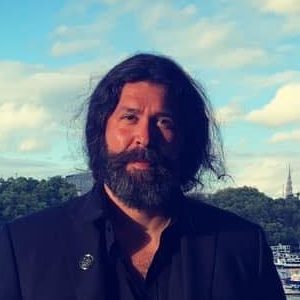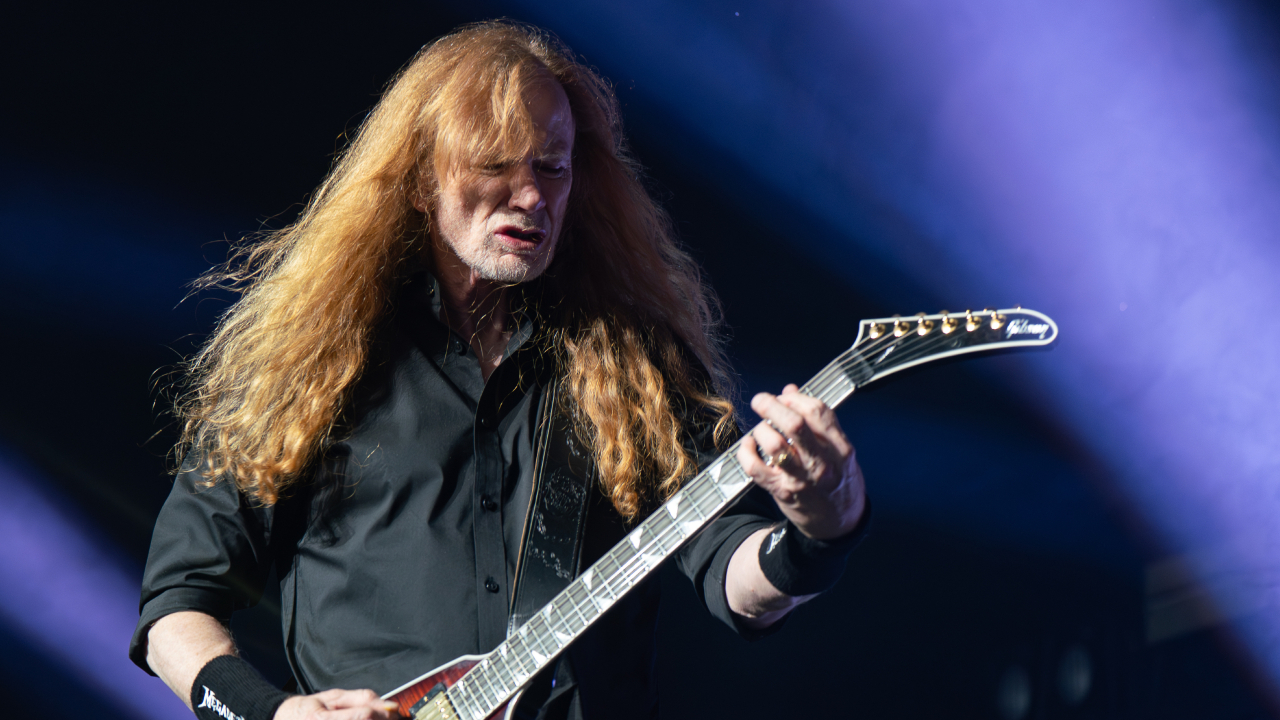Hammerfall: "The revolution is for heavy metal to be accepted"
Hammerfall's Oscar Dronjak is very pro metal

Hammerfall's guitarist Oscar Dronjak reveals all on the band's hiatus, why they came back and the difference between the UK and Swedish metal scenes. This interview was originally broadcast on the Metal Hammer Radio Show.
Well, big news in your world, you went on a hiatus for about a year and a half man. What happened? Why the decision to leave and why come back now?
“We made this decision quite early. We were a little bit tired of the constant cycle of everything, you know? Every time we finished a tour we had to get back into song-writing mode and then recording mode and then promotion mode and then touring mode again. We had done this for 15 years without a break basically, so it was just time to take a break.”
It’s a long time to be on what you might describe as a bit of a hamster wheel. Your last record, it was met with warm response, obviously some controversy – doing covers of popular songs and things like that can certainly cause issues in some circles – but was it really just about being overworked? Or did you feel like you just needed to take a step back and maybe think about what Hammerfall’s direction was?
“I think that was the result of it, not the cause of it. I think if we continued on without a break we might not be having another life for 15 more years – which was the idea. That’s what we wanted to do, we want to ensure that we have another 15 years ahead of us, instead of fizzling out. If you get tired of something and you have to do it, there’s no way to get out of it and also a band commitment you can’t, well you can obviously quit whenever you want, but if you have any sense of dignity I think you should do your tour so to speak. If we were in the military, you have a year tour and then you go home and then you can do whatever you want.”
Indeed, get out of the trenches so to speak.
“Yes, so if we commit to doing something, like releasing the album or anything, this is a two year period or maybe three if you include the recording and writing of the songs and everything. So, we felt, take a step back, just recharge the batteries basically.”
Sign up below to get the latest from Metal Hammer, plus exclusive special offers, direct to your inbox!
So, what did you get up to? How do you kill that time or how do you spend it?
“I think the whole point was so that people could do whatever they wanted without having to worry about if this was going to interfere with anything Hammerfall’s going to do. So people could do anything they wanted to do, I think everybody was involved in music one way or another. I wrote a book about Hammerfall, which was released in Sweden last year, which was a very nostalgic trip for me, to go down memory lane, I went into great detail of everything we’ve ever done with the band. I did interviews with almost every band member that we had and some other people as well. It was a pretty thorough thing, but that helped me to get into the mood for the next album, the new album. I believe having done this, because I spent about six or seven months on this, just writing, researching, transcribing interviews and planning everything, that when I was done with it I had relived everything very vividly. So I was ready to write another Hammerfall album, that was really good therapy I guess.”
It sounds very therapeutic indeed. So, you basically revisited the early days of Hammerfall. You’re clearly nostalgic for a different time, a different place perhaps, you know the early days when everything was brand new. Tell us about that time? About the very beginning, about the Gothenburg sound and what happened?
“Well, I formed Hammerfall in 1993, so it took a couple of years before anything happened, so to speak with the band, because the first album came out in ’97. The metal scene in the ’90s was terrible in Sweden. The melodic metal scene I should say, actually. Heavy metal was a bad word, it was something that you could not under any circumstances be affiliated with. If you did you were a loser and everybody had the right to laugh at you basically, which they did. We didn’t care about that, we played heavy metal music because we love heavy metal music. We grew up with it, we never stopped loving it. So that was the whole reason and that is the basis for Hammerfall, for the sound of the band. We love what we do, we still love what we always have listened to. If we didn’t have that love of the music we would definitely have chosen something different to play, because nobody could think that heavy metal music would be, or rather, a new heavy metal band would be able to have any kind of success in the ’90s. When Glory To The Brave came out nobody expected any kind of success like this.”
That’s really interesting though, because a lot of people from the outside might have assumed that you all got along and that perhaps you had this mutual respect for each other being from the same country and indeed, the same city, this famous fount of this sound that went everywhere in the ’90s, but you’re saying it’s not so. You didn’t get along with those guys?
“Well, that’s was not actually at all what I meant. You mean within the music scene? The Gothenburg sound scene, everybody’s friends, everybody respects each other very much and that has always been the case. At least face to face, I don’t know what people are saying about it before. Everybody that was in those bands like, Dark Tranquillity and In Flames, we knew each other for years before that. We also had great respect for the drive, because these bands had really made something out of their careers, but I don’t know how many of those guys understood the heavy metal world the way I saw it. I know that Mikael Stanne from Dark Tranquillity, he was singing for Hammerfall in the beginning. He has a love for the melodic metal, but I know there are other people that might not have the same love, but they had the respect for people for doing something they believed in. I think that showed. When you go on stage and you’re wearing leather and studs and stuff and everybody else is wearing cut off plaid shirts, you know the lumberjack shirts and shorts of course. You stand out, and that was what I meant.”
**You were talking about how you faced a bit of derision and judgment from your peers and the wider group, because suddenly what you might describe as red blooded heavy metal became suddenly really uncool in the 1990s and I guess, now things are a bit different. I think when, and you can correct me if I’m wrong, when Dio very tragically passed away, I think it woke up a lot of people just like, how valuable people like that were in our world, how influential and everything else. It’s almost as though it’s come full circle because metal wanted to become something different and almost I guess, sever itself from its origins in the ’90s and it’s almost like 20 years later it’s cool to be classic again. Does that make sense to you? **
“Yeah, I think it makes sense from a UK perspective. Sweden has had a different perspective a lot longer than if you’re just discovering this know is what I’m saying. When we came out with the first album at the end of the ’90s that melodic heavy metal became popular again. Bands like Iron Maiden were playing in the ’90s in Sweden for about 800 people or so and just a couple of years later when Bruce Dickinson came back they were doing arenas again. So it was a huge – something definitely happened around the millennium thing there. I don’t know, Dio has always been big in Sweden as well. It’s a different climate. I remember when our second album came out there was a reviewer from, I don’t know which magazine it was, it was one of the big ones here in the UK and the review was plain and simple, ‘This sucks,’ that’s it. So, you guys have been a little bit behind on times for that if you know what I mean. Not everybody of course.”
** There’s no question that different climates you might say, or scenes, have a different responsiveness. It certainly seems like there are a lot of bands around now that have gone back to a time and a place in terms of how they compose music that is 30⁄40 years old. Which is interesting because it’s almost like there’s a whole scene built around it now. Now, you’ve called the new album ®Evolution, or indeed Evolution. Why the name and what does that actually signify?**
“If you follow Hammerfall you know that all the titles have a certain meaning to us, like it’s not just something we grab out of thin air and put it on the album. With the time off for a year and a half/two years, this was because we had a long career that I think has evolved with every album, but the ®Evolution part is because, the revolution is something we’ve always been fighting for. The revolution is for heavy metal and this type of music to be accepted and respected for what it is and not something to be laughed at. We’ve come a long way since the ’90s, but there’s still that amount of respect that’s still lacking from some people. Like you say, in the past couple of years it’s definitely gotten better with this. With the death of Dio it’s sad that to think that something like that would turn it. On the other hand that’s something good that came out of it anyway, you know, because it was a really terrible, terrible thing to lose him.”
Hammerfall’s upcoming album ®Evolution is out 1st September. Pre-order it here.
Alexander Milas is an erstwhile archaeologist, broadcaster, music journalist and award-winning decade-long ex-editor-in-chief of Metal Hammer magazine. In 2017 he founded Twin V, a creative solutions and production company. In 2019 he launched the World Metal Congress, a celebration of heavy metal’s global impact and an exploration of the issues affecting its community. His other projects include Space Rocks, a festival space exploration in partnership with the European Space Agency and the Heavy Metal Truants, a charity cycle ride which has raised over a million pounds for four children's charities which he co-founded with Iron Maiden manager Rod Smallwood. He is Eddietor of the official Iron Maiden Fan Club, head of the Heavy Metal Cycling Club, and works closely with Earth Percent, a climate action group. He has a cat named Angus.


